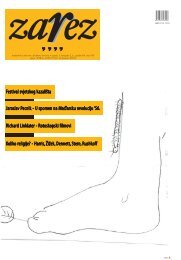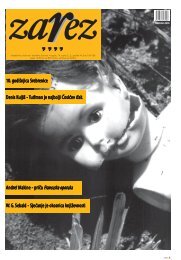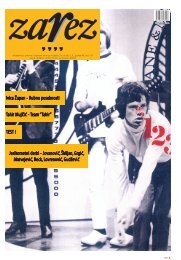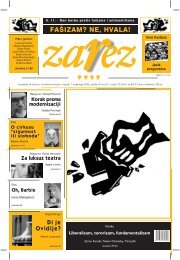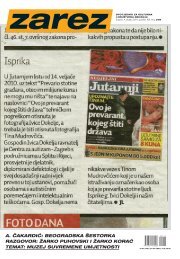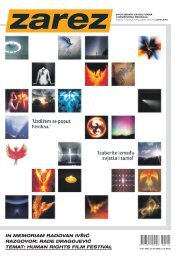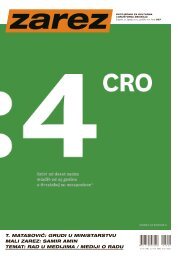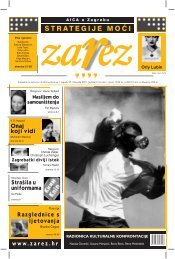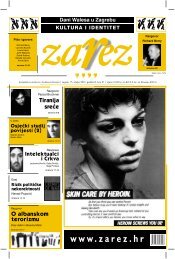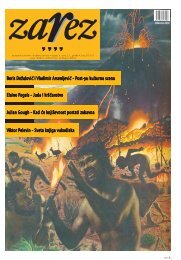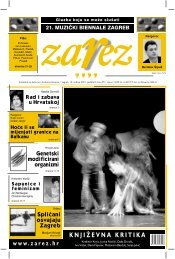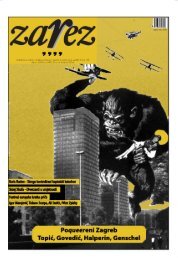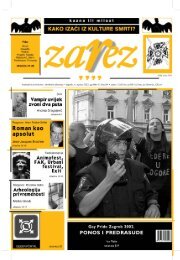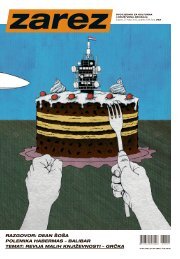Supplement Contemporary Croatian Literature, pp. 15 - 34 - Zarez
Supplement Contemporary Croatian Literature, pp. 15 - 34 - Zarez
Supplement Contemporary Croatian Literature, pp. 15 - 34 - Zarez
- No tags were found...
You also want an ePaper? Increase the reach of your titles
YUMPU automatically turns print PDFs into web optimized ePapers that Google loves.
<strong>34</strong> II/40, 12. listopada 2,,,.FRAKCIJAperforming arts magazinehe performing arts magazine Frakcijais published jointly by the Center forDrama Art and the Academy for DramaArt, Zagreb. Its main focus is on exploringrelevant occurrences in performing artstheory and production in Croatia and abroad.Within the scope of its abilities, Frakcija endeavoursto encourage new tendencies in<strong>Croatian</strong> production and to present them internationally.Among the projects and authorsincluded are Robert Wilson, Eurokaz – Festivalof the New Thetre, Peter Sellars, WienerFestwoche, Eugenio Barba, Branko Brezovec,Societas Raffaello Sanzio, Nataša Rajkoviæ/BoboJelèiæ, Goat Island, Ivica Buljan, JanFabre, Vili Matula, etc.The editor-in-chief, Goran Sergej Pristaš,himself a dramaturge, theatre director and juniorlecturer at the Academy for Drama Art,has gathered a team of diverse and highlycompetent <strong>Croatian</strong> and international contributors,such as Lada Èale Feldman, Darko Suvin,Hans-Thies Lehmann, Valentina Valentini,Elin Diamond, Ljiljana Filipoviæ, JosetteFéral, RustomBharucha,ViktorMisiano, NatašaGovediæand Ivica Buljan.Apartfrom the originalcontributions,themagazine includestranslationsof relevanttheoreticalessays bythe likes of Derrida, Gilles Deleuze, Lacan,Judith Butler, Foucault, Camille Paglia, SueEllen-Case, Barthes or Slavoj iek. Of thesubjects covered in various issues the followingare of special interest: the Bertolt Brechtcentennary, sexuality, and Giullio Camillo'stheatre of memory.In collaboration with various internationalinstitutions, Frakcija publishes special issuesin English. The issue on Utopia/Dystopia wasrealised under the auspices of the Landscape Xproject, as a part of the programme Stockholm-Cultural Capital of Europe 1998, while the oneentitled disOrientation: Eastern Europe (1999)was conceived with two leading Europeantheatre festivals, Internationales SommertheaterFestival Hamburg and the AarhusFestuge, Denmark. FaMa, a special bilingual,German/<strong>Croatian</strong>, joint issue of Frakcija andthe Slovene magazine Maska, on the subjectof Body/Difference, was published in collaborationwith the Dance2000 Festival, Munich.Together with the Chapter Arts Centre, Cardiff,Wales, Frakcija realized the issue on iconoclastictheatre, Disturbing (the) Image.This year the magazine was awarded a specialplaque for the international promotion of<strong>Croatian</strong> theatre, and a special diploma on the<strong>Zarez</strong>- www.zarez.com<strong>Zarez</strong> is independent biweekly magazinefor cultural and social affairs. Its first issuewas published in February 1999.Feral Tribune - www.feral.hrOne of the most influential politicalweekly magazines, both in Croatia and inthe whole area of former YugoslaviaNacional - www.nacional.comBesides Feral Tribune, Nacional is probablythe most influential political magazinein Croatia. It contributed to democratizationof the country.HINA - www.hina.hrCentral press agency in CroatiaVjesnik - www.vjesnik.hrDaily newspaperKlik - www.klik.hrTheatre Publishing Triennale, Novi Sad, 2000.As of the year 2001, Frakcija will be publishedin six bilingual, <strong>Croatian</strong>/English, issues. Thesubjects of following issues include: energy,radical movements in Eastern Europe, religionand the theatre, dance: concept or skill.QuorumLiterary magazineTomislav BrlekQuorum has been published regularlyever since the mid-eighties. During theeighties, it provided space for theyoungest generation of authors, which laterbecame known as a “Quorum generation”.Among its members were some of our mostacclaimed literary names today, such as MiroslavMiæanoviæ, Zoran Feriæ, Edo Popoviæ,Branko Èegec etc. Their writing favored thefragmented style, poetry, rock music and socalled "urban fiction."The magazine has also proved vital and importantfor the generation of writers whostarted publishing their works in the nineties.Quorum’s most enduring quality is its editorialpolicy of openness to the latest movementsin history and fiction. The editorial boardhas continually shown su<strong>pp</strong>ort for many youngauthors, giving them space and o<strong>pp</strong>ortunitiesfor new projects.In many ways, the <strong>Croatian</strong> literary scene inthe nineties was very idiosyncratic. Not onlyhas it been affected by the war, but also by thehostile attitude of Tuðman’s Ministry of Culture,which failed to provide for a relevant literaryjournal dedicated to young authors. Everythingdepended on individual initiatives, resulting in aconfusing situation where several journals, magazinesand pop-magazines aspired to the leadingposition.None succeededin becomingthe best in apurely literarysense; nor didthe any of themhad the honorof becoming anexclusive anddogmatic representativeof theGeneration X.Which, in fact,is good thing.Whether we admitit or not,the literary scene has undergone the process ofdemocratization which opened many new possibilities.During the process, Quorum has proventhat its open policy is genuine, since it continuedto help young writers by publishingthem and helping them gain recognition.We could say that in the nineties, Quorumhas turned into a trans-generational magazine.It has proven that successful cooperation ispossible between writers of different generations,a perfect formula for a respected magazine.Rade Jarak"Moderna vremena" - /www.modernavremena.hrThe biggest and the most popular <strong>Croatian</strong>online bookshop that sells new andused books. It offers plenty of informationabout recent editions and publishers,interviews with writes, thier texts etc.Hyp.txt, Libra - www.autonomous-c-factory.hr/hipertekstwww.autonomous-cfactory.hr/maseThis address allows one to read - in <strong>Croatian</strong>- hypertexts or "texts that branch outand present the reader with a choice, andthe best way to read hypertexts is on thein interactive screen” (T. H. Nelson). Theproject was launched by editors of literaryjournal Libra Libera.enska infoteka -www.zinfo.hrEducational and reference center forwomen, established in Zagreb eight yearsago, as the first center for feministresearch in Croatia and East EuropePackagingof GovernmentElections in Croatia1995 and 1997 :collected paperspublished by Alinea, Zagreb,1999.ackaging of Government is a result of theoretical analyses, empiricalinvestigations, and the analysis of law regulations on multi-partyelections in Croatia. It provides a complete overview of electionsand presents the view of Croatia from the standpoint of sociology andpolitical science...In his valuable theoretical articles, Srðan Vrcan discusses the views of the ruling political party, its mottothat “nation comes before democracy”, and its su<strong>pp</strong>ort of ethnic homogeneity as an expression of state stability.At the same time, this attitude represented a serious obstacle to democratic transition and genuinepolitical pluralism… The author is particularly critical of the efforts to legitimize political power by metasocialand transcendental phenomena, and of attempts to justify authoritarian style of government by presentingit as a holy mission. Political power elite in Croatia controlled every area of social life by relying onwidespread political clientelism, which gave rise to a block bound by common interest – something akin to“alliance for profit”…Vrcan also elaborates on the concepts of ethnic policy, political ethnicity and increasingly nationalistideas of state in Croatia… In another discussion, Vrcan expounds on the idea of the democratization of societyand the technology of government. The 1995 and 1997 elections confirm the continuing trend to seeelections as a technology of government, and not as a pluralistic shaping or an expression of the political willof the people…Boris Buklijaš’ article on changes and amendments to numerous law regulations after 1993 also offerscomprehensive and useful insight. In his conclusion, the author criticizes the introduction of special Diasporalists in 1995, which gave great privileges to a minor part of the elective body, predominantly those livingin Bosnia and Herzegovina, for the simple reason that most of them were su<strong>pp</strong>orters of the ruling Tuðman'sparty, <strong>Croatian</strong> Democratic Union (CDU)…Draen Laliæ and Suzana Kunc analyzed the election TV ads of the parties participating in pre-electioncampaigns in 1995 and 1997. Their analysis, describing the research methodology in detail, shows that theCDU campaign emphasized the “nation-building” and nationalist elements, whereas the ad campaigns ofo<strong>pp</strong>osition parties insisted on “society-building” elements and the development of democratic society. Semioticanalysis of TV spots is also interesting… Nenad Bulat analyzes the changes in the structure of <strong>Croatian</strong>political scene between 1995 and 1998. The author describes the first five years of multi-party democracyin Croatia, calling that period a “pre-political stage”, because the task of building the system with recognizablepolitical options and the development of autonomous institutions of civil society is still ahead ofus…Damir Štrelov provides an overview of the sociodemographic characteristics of the elective body. Incomparison with 1996, some significant changes took place on the <strong>Croatian</strong> political scene in the period beforethe spring of 1998. It is steadily more a<strong>pp</strong>arent that CDU’s popularity is decreasing, while the numberof SDP su<strong>pp</strong>orters keeps on growing…In conclusion, we can say that this compilation of papers offers many solid theoretical views and resultsof empirical research, which remain relevant even after the 1999/2000 elections.Dušan ubriniæAddress: Hebrangova 21, Zagreb, CroatiaPhone: + 385 1 4855 449, +385 1 4855 451Fax: +385 1 4856 459E-mail: zarez@zg.tel.hrWeb: www.zarez.comPublisher: Druga strana, d.o.oPublishing Manager: Boris MarunaEditor in-chief: Andrea ZlatarAssistant Editor: Katarina Luketiæ, Iva PlešeCopy Editor: Boris BeckEditorial board:Sandra Antoliæ, Tomislav Brlek, Grozdana Cvitan, Dean Duda,Nataša Govediæ, Giga Graèan, Rade Jarak, Agata Juniku,Pavle Kaliniæ, Branimira Lazarin, Jurica Pavièiæ, Dušanka Profeta,Dina Puhovski, Srðan Raheliæ, Sabina Saboloviæ, David Šporer,Igor Štiks, Gioia-Ana Ulrich, Davorka Vukov ColiæLayout Editor: eljko ZoricaLayout: Romana PetrinecLanguage Editor: Marko PlaviæMarketing: Marcela IvanèiæAdministration: Nataša PolgarPrinted by Novi list, Rijeka, Zvonimirova 20aThis issue is subsidized by Open Society Institute Croatia and <strong>Croatian</strong>Ministry of Culture



